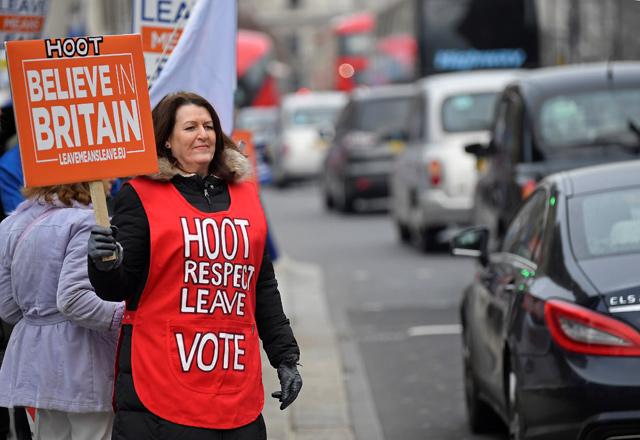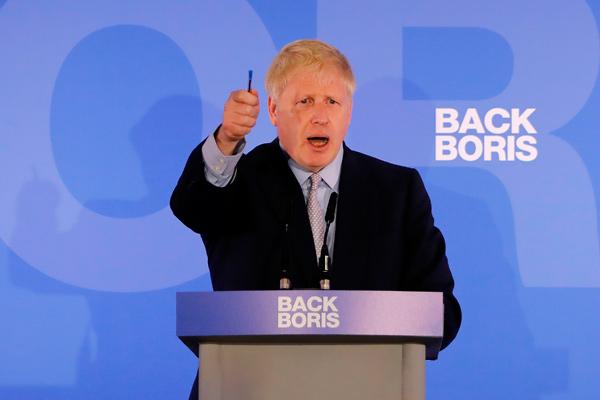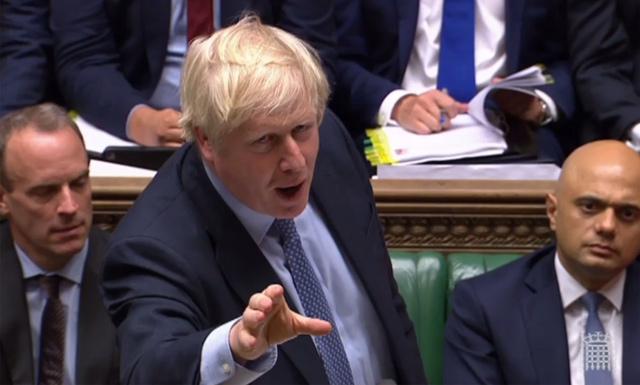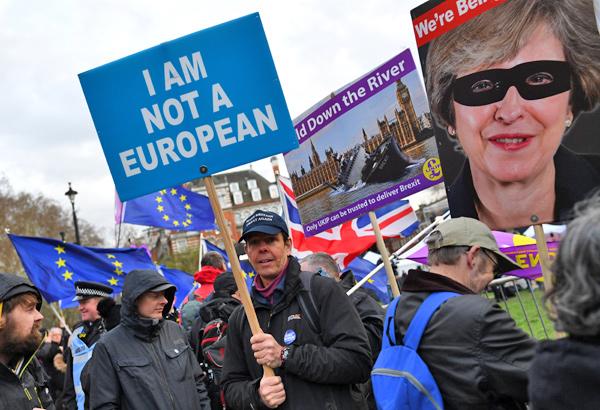You are here
Can Britain’s parliament prevent a no-deal Brexit?
By Reuters - Jan 10,2019 - Last updated at Jan 10,2019

A pro-Brexit protester stands outside of the Houses of Parliament in London, Britain, on Wednesday (Reuters photo)
LONDON — British Prime Minister Theresa May’s political weakness was exposed by a series of defeats in parliament this week, prompting claims that rebel lawmakers can wrest control of the process to leave the European Union.
But can lawmakers stop a no-deal Brexit?
On Tuesday, lawmakers voted to limit the government’s tax-raising powers in the event it decides to pursue a no-deal Brexit without parliament’s explicit approval, part of a campaign to stop the country leaving the EU in a disorderly fashion.
Lawmakers again defeated the government on Wednesday, forcing the prime minister to come back to parliament within three working days with a new plan if, as is widely expected, her Brexit deal with the EU is defeated on January 15.
Is there a majority in parliament for stopping a no-deal Brexit?
Almost certainly- yes. Tuesday’s vote indicates that all the main opposition parties and at least 20 lawmakers in the ruling Conservative Party are opposed to leaving the EU without a deal.
May is the weakest British leader in a generation, with a working majority of 13 lawmakers in parliament. Her minority government is dependent on the support of a small Northern Irish Party to pass legislation.
As the opposition parties and pro-European lawmakers in the Conservative Party have proved this week, they have the numbers to defeat the government.
So can they stop the government leaving without a deal?
There is no clear legal route available to them to stop a no-deal Brexit.
Opposition to no-deal in itself is not enough. They can only stop Brexit if there is a clear majority in favour of an alternative outcome to the prime minister’s deal. At the moment, under British law and Article 50 of the European Union Treaty, Britain will leave the EU on March 29 at 23:00 GMT with or without a deal. This date was set in law in the Withdrawal Act that was passed by lawmakers last June.
According to The Institute for Government, ministers can change the act by secondary legislation if another date is contained in the withdrawal agreement or if an Article 50 extension is secured.
But if there is no deal, and therefore no withdrawal agreement, they would have to change the date through new primary legislation.
“Is there a parliamentary route by which Brexit can be stopped? I do not believe so,” Chris Heaton-Harris, a junior Brexit minister, told a parliamentary committee on Wednesday.
“With the legislation that we have passed, if we do not leave with a deal, currently, we will be leaving without a deal.”
What else can lawmakers do to stop a no-deal Brexit?
To minimise disruption in the event of a no-deal Brexit the government is expected to have to bring forward at least some primary legislation.
At least four new laws, including on such matters as trade, immigration and agriculture, need to be passed before Brexit and they could potentially be hijacked to make leaving without a deal harder.
Bernard Jenkin, a pro-Brexit lawmaker in the ruling Conservative Party and chair of the constitutional affairs committee, said that although this would hit the government’s no-deal preparations it would not prevent Britain leaving.
“It is disruptive. It is sabotage. But if that is what the House of Commons wants to do it can do it. But it doesn’t change the date,” Jenkin said.
Are there other ways for rebels to stop a no-deal Brexit?
Yes, but they are political, rather than legal avenues.
If lawmakers by a decisive majority voted in favour of extending the EU exit process or for a second referendum the motions would not be legally binding on the government, but it would be hard to resist the political force of such a vote.
For example, a parliamentary vote is not a legal requirement for military action, but David Cameron, then prime minister, abandoned plans for intervention in Syria after a parliamentary defeat in 2013.
Are the rules set in stone?
Britain does not have a codified constitution. Instead, it has laws, conventions and practices that have evolved over centuries, often during national crises.
That leaves some room for manoeuvre.
The speaker of the House of Commons, John Bercow, said on Wednesday that if parliament was always bound by precedent “nothing would change and things do change”.
Related Articles
LONDON — Several of the contenders to replace Prime Minister Theresa May have said Britain should leave the European Union on October 31, ev
LONDON — Prime Minister Boris Johnson headed into a fresh Brexit showdown in parliament on Wednesday after being dealt a stinging defeat ove
LONDON — The British parliament was due to vote on Thursday on seeking a last-minute Brexit delay, while Prime Minister Theresa May piled re



















